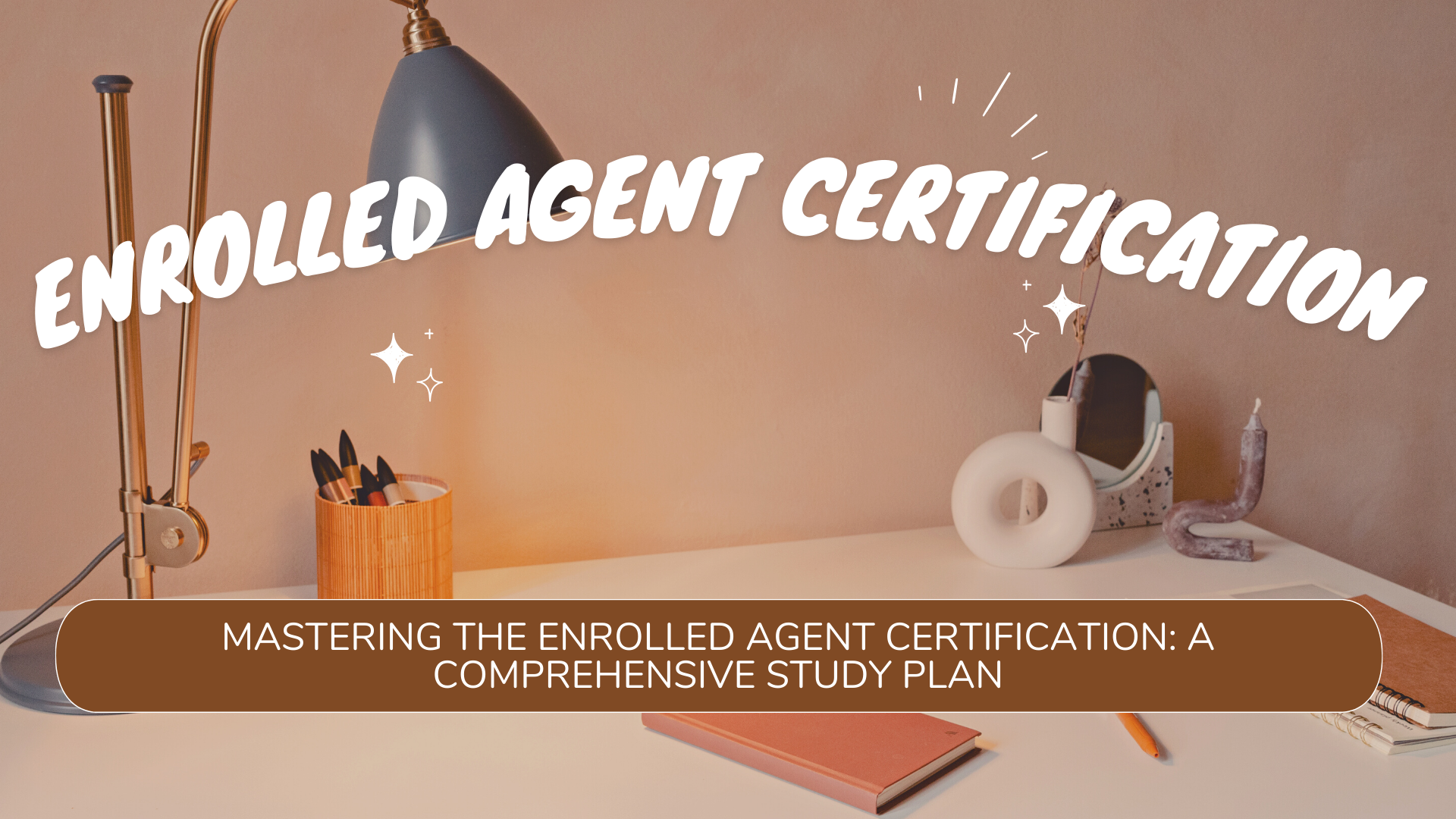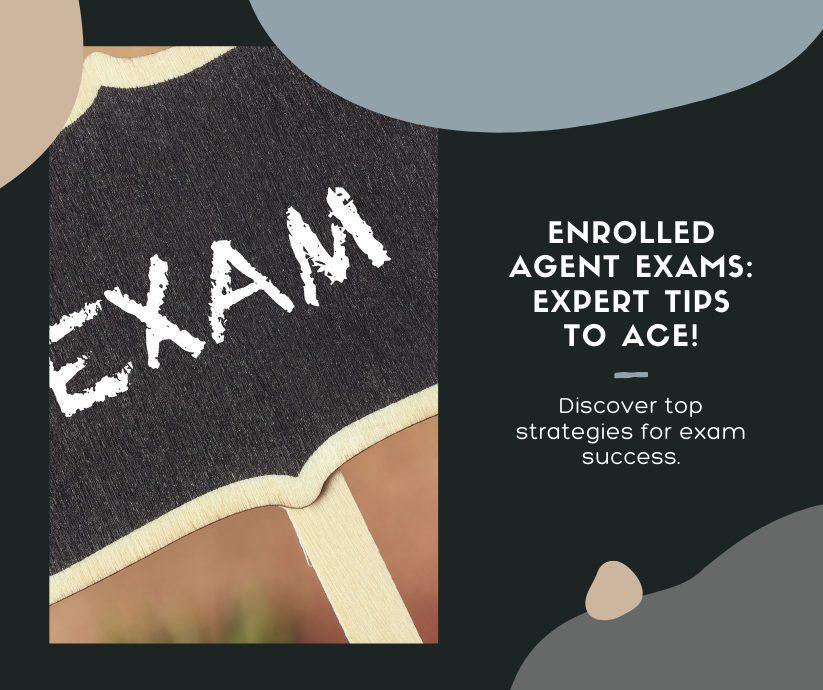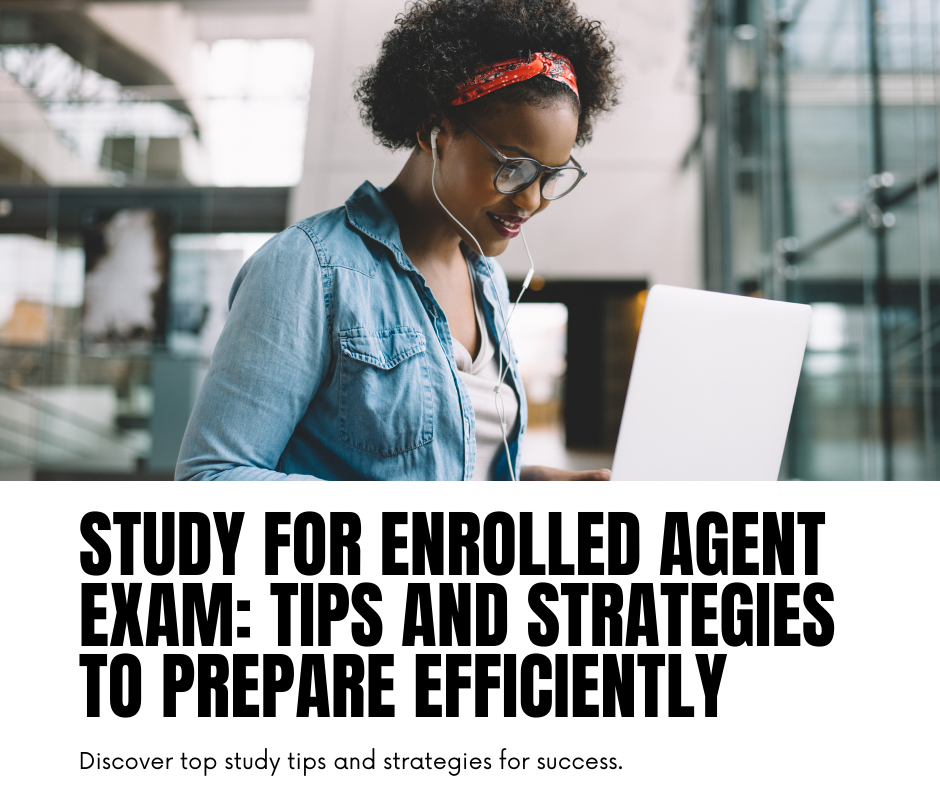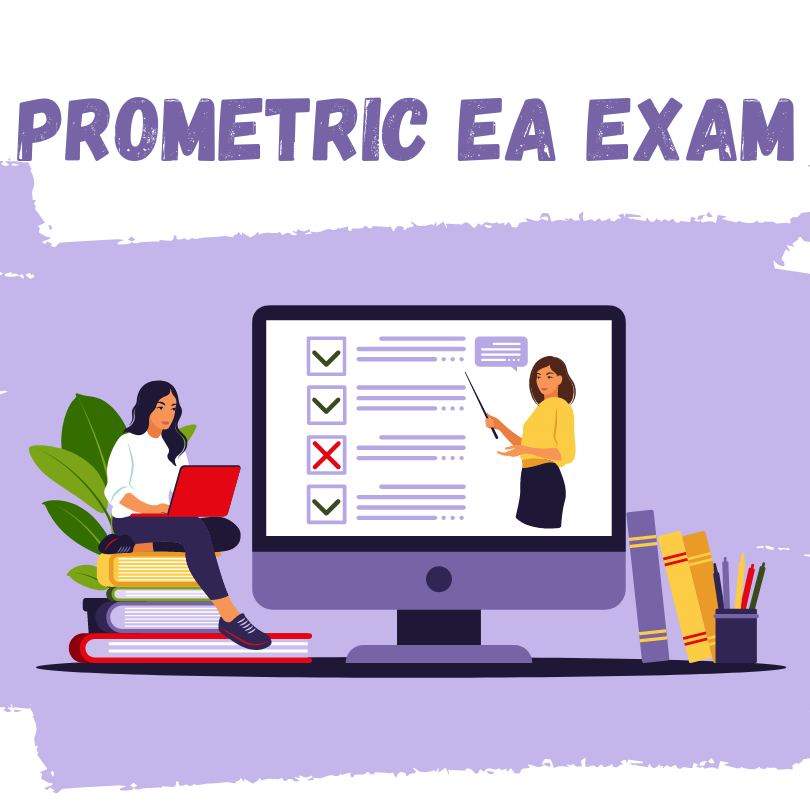Become an Enrolled Agent: Step-by-Step Guide
Passing the Enrolled Agent (EA) exam opens the door to...

Imagine standing at the beginning of a labyrinth, equipped only with a map and a sense of determination. Much like a skilled navigator who must interpret ambiguous trails, you must decode complex tax codes and regulations to emerge successfully as an Enrolled Agent:
Your journey requires a strategy as intricate as the labyrinth itself.
As you prepare for the Enrolled Agent certification, the vast terrain of tax law unfolds before you, laden with ever-changing rules and exceptions. Your study plan must be agile and comprehensive, ensuring no detail escapes your scrutiny.
The Enrolled Agent (EA) certification represents the pinnacle of professional competency in the sphere of taxation, a mark of expertise conferred by the Internal Revenue Service (IRS). To achieve this designation, candidates must demonstrate a thorough understanding of tax codes, regulations, and their practical application, with an unwavering commitment to ethical standards.
Embarking on this path demands a meticulous approach to learning and preparation. As with any rigorous professional examination, the EA certification necessitates a robust study plan that incorporates a diverse range of educational resources, rigorous practice, and an intimate familiarity with IRS procedures. Prospective EAs must be adept at navigating complex tax scenarios, ensuring their readiness to represent taxpayers with the utmost competence and confidence.
The Enrolled Agent certification demands mastery of tax regulations and the ability to represent taxpayers before the IRS meticulously and effectively.
Prospective agents must pass three exams, covering Individual and Business tax returns, and representation, practices, and procedures.
Enrolled Agents are federally certified tax practitioners with unlimited rights to represent taxpayers.
With an EA certification, professionals exhibit an exceptional level of tax knowledge, enabling them to navigate the intricacies of tax law and advocate for taxpayers confidently.
The Enrolled Agent exam, formally known as the Special Enrollment Examination (SEE), is segmented into three distinct parts, each focusing on critical areas of tax law and representation. Prospective agents must demonstrate proficiency across all sections to achieve certification. These sections include Individual Taxes, Business Taxes, and Representation, Practices, and Procedures.
The first part, focusing on Individuals, evaluates understanding of income and deductions, tax credits, compliance and other issues. Mastery here is essential for advising individual taxpayers.
Part two concentrates on Businesses, encompassing entities, business deductions, and taxes. Expertise in these areas is vital for guiding businesses through tax matters.
The third and final part covers Representation, Practices, and Procedures. It assesses knowledge of ethical and procedural regulations governing tax practice, ensuring readiness to advocate effectively.
Upon passing all three sections, candidates are awarded the prestigious designation of Enrolled Agent, certifying their expertise in the domain of taxation and representation before the IRS.
Each part of the SEE is delivered in a multiple-choice format, composed of 100 questions, and candidates have 3.5 hours to complete each section. They are designed not only to test knowledge, but also the ability to apply principles in practical scenarios.
However, the clock is not your ally during this exam. Time management strategies must be refined to balance carefully reading and understanding each question with the need to progress steadily through the examination.
Embarking on the Enrolled Agent certification journey begins by constructing a robust study foundation, incorporating thorough understanding of taxation principles, familiarity with IRS procedures, and strategic exam preparation. Consider this foundation the bedrock of your expertise, a necessity to withstand the rigorous examination process.
Your primary step involves immersing yourself in the core subjects that form the examination framework. A meticulous approach to mastering these concepts is non-negotiable, facilitating not just the recall but the application of knowledge under the pressures of the testing environment.
To secure success in the Enrolled Agent exam, one must be adept with a variety of tax principles.
The complexity and interrelationship of these topics necessitate a strategic study approach.
An Enrolled Agent must not only memorize but also understand how to apply these concepts to real-world tax situations.
A strategic selection of study materials is crucial for effective preparation.
These materials should intertwine with your study plan.
Your proficiency and confidence will be bolstered through consistent engagement with these essential study materials.
Creating a timeline with measurable goals ensures consistent progress in mastering Enrolled Agent exam concepts. Design a study schedule that complements your personal and professional commitments, allowing for flexibility without compromising on coverage or intensity of review sessions.
To reinforce comprehension, incremental repetition over time—termed spaced repetition—is more effective than cramming. Integrate this technique into your study plan through regular review of key concepts and practice questions to ensure long-term retention and a deeper understanding of tax-related matters.
Regular self-assessment is critical to monitor your learning advancement and adjust your study plan accordingly. Utilize practice exams to identify areas of weakness and transform them into strengths, optimizing your preparation for the Enrolled Agent certification exam.
Time management is pivotal for success in the Enrolled Agent exam preparation. Integral to this process is establishing a structured schedule. This ensures dedicated study hours are maintained, maximizing the efficiency of your preparation time and mitigating potential distractions.
Prioritize tasks based on their relevance and difficulty. Focus initially on concepts that are challenging or carry significant weight in the examination.
Allocate specific time blocks for intensive study sessions, incorporating short breaks to refresh your mind and maintain peak cognitive function throughout your studying endeavors.
Utilize a digital or physical planner to keep track of your study plan, deadlines, and revisions. This makes it easier to adapt to any changes and stay on course with your preparation.
Reserve time slots at regular intervals for the review of previously mastered materials. This practice strengthens memory retention and ensures you remain proficient in all aspects of the Enrolled Agent exam curriculum.
Remember, quality trumps quantity when it comes to study time. Concentrated, undistracted sessions are far more valuable than longer, less focused periods of study. Adjust your technique as needed, seeking to align with your most effective periods of concentration and productivity.
Developing effective study habits is essential to mastering the Enrolled Agent exam.
Consistency is key; sporadic study sessions are less effective than regular, committed practice.
An organized approach, combining a strategic study schedule with regular assessments, paves the way to exam success.
A robust regimen of practice exams and sample questions is fundamental to gauging your exam readiness. Exam conditions can be emulated through timed practice tests, which not only develop time management skills but also help identify knowledge gaps. These simulations should mirror the EA exam’s environment and format as closely as possible, creating a familiar setting that can alleviate test-day anxiety.
In the final stages before the examination, a thorough review of all study materials—incorporating a critical analysis of your practice test results—is paramount. This analysis enables a strategic focus on areas requiring additional study, ensuring comprehensive coverage of the content. As you inch closer to your test date, frequency and intensity of practice should crescendo, with a focus on sharpening test-taking strategies and honing your instincts for the examination’s rhythm and types of questions.
Practice exams are invaluable tools, allowing candidates to apply tax law knowledge in a simulated exam environment. They offer a practical benchmark, enabling you to measure your progress against the exam’s stringent standards, thus guiding your final study efforts.
Timed practice tests replicate the exam’s pace and pressure. Identifying weak areas becomes clearer when under timed conditions.
Furthermore, practice exams reinforce content retention and enhance problem-solving agility, essential skills for mastering the EA examination’s demands.
Deliberate and repeated exposure to practice questions sharpens analytical skills, fostering a deeper understanding of complex tax scenarios you will encounter. Reflecting on each answer choice promotes an intricate grasp of the rationale behind the correct solutions.
Meticulously reviewing misanswered questions reveals common pitfalls, allowing you to tailor your study approach for maximum efficiency. It’s crucial to comprehend why an answer was incorrect to prevent similar mistakes.
Finally, continually iterating practice exams develops stamina and test-taking resilience, crucial for enduring the rigorous hours of the actual examination. As your confidence grows, so does your proficiency in navigating the challenging landscape of tax law.
As your Enrolled Agent exam draws near, a comprehensive final review is imperative. Examine each section thoroughly, ensuring mastery over the nuances of tax law and related regulations. Methodical revisiting of complex topics and reinforcing concepts through summarized notes will fortify your knowledge base.
Condense key points into concise, accessible formats. Use flashcards, charts, or mnemonic devices to assist retention and spur recall during the exam.
During this final phase, manage your time strategically, prioritizing areas where your proficiency may be weaker. Allocate more review time to these segments, ensuring a balanced understanding across all examination content. Also, simulate exam conditions by timing your review sessions to enhance your time management during the test.
Your mental and physical preparedness are equally as critical. Rest adequately, maintain a balanced diet and hydrate well. On test day, approach each question methodically, reading carefully to understand what is asked. Apply a stepwise approach to calculations, and remain mindful of the clock without rushing. If uncertain, mark a question for review and proceed, optimizing your performance across the entire exam. Remember, it’s not merely about scoring a “pass;” it’s about showcasing your comprehensive expertise in tax representation.
Yes, EA certification is definitely worth it for tax professionals as it demonstrates expertise, boosts career prospects, and allows for representation of clients before the IRS.
Becoming an IRS enrolled agent requires a significant commitment of time and effort. The process typically takes several months to complete.
First, candidates must pass the Special Enrollment Examination (SEE), which consists of three parts: individuals, businesses, and representation, practice, and procedures. Each part has its own unique set of topics and questions, covering various aspects of tax law and regulations.
To prepare for the exam, candidates often spend a considerable amount of time studying and reviewing the relevant materials. This may include textbooks, IRS publications, and online resources. The amount of time needed for preparation can vary, depending on an individual’s prior knowledge and experience in the tax field.
After passing the exam, candidates must then apply for enrollment with the IRS. This process involves submitting an application, providing proof of identity and good moral character, and paying the necessary fees. The IRS reviews the application and conducts a background check before granting enrollment.
Overall, the process of becoming an IRS enrolled agent can take several months from start to finish. It requires dedication, perseverance, and a strong understanding of tax law and regulations. However, the rewards of becoming an enrolled agent, including the ability to represent clients before the IRS, make the investment of time and effort worthwhile.
EA and CPA are both professional certifications in the field of accounting and taxation, but they have different areas of focus and requirements. An EA, or Enrolled Agent, is a tax specialist who is authorized by the IRS to represent taxpayers in front of the agency. EAs are experts in tax code and regulations and provide tax planning, preparation, and representation services to individuals and businesses.
On the other hand, a CPA, or Certified Public Accountant, is a broader designation that covers multiple areas of accounting, including tax, audit, and financial planning. CPAs have a deeper understanding of accounting principles and can provide a wide range of services, including financial statement analysis, budgeting, and consulting. CPAs typically work in public accounting firms, corporations, or government agencies.
Which one is better, EA or CPA, depends on your career goals and the specific role you want to pursue. If you are primarily interested in tax-related work and want to focus on helping clients with their tax obligations, becoming an EA could be a good fit. EAs have a specialized knowledge in taxation and can provide in-depth tax advice.
On the other hand, if you have a broader interest in accounting and want to offer a wider range of services to clients, becoming a CPA may be more suitable. CPAs have a comprehensive understanding of accounting principles and can provide services beyond just taxation, such as auditing and financial planning.
Ultimately, both the EA and CPA designations have their merits and can lead to successful careers in accounting. It’s important to consider your interests, career goals, and the specific requirements of each certification before making a decision.
The enrolled agent exam can be challenging due to its comprehensive nature and the depth of knowledge required. However, with proper preparation, including thorough study of tax laws and regulations, as well as practice exams, individuals can greatly increase their chances of success.

Passing the Enrolled Agent (EA) exam opens the door to...

The journey to becoming an Enrolled Agent is both challenging...

Imagine gazing at a promising future as a tax professional.However,...

Achieving the status of an Enrolled Agent is a significant...

Are you envisioning a successful career as an Enrolled Agent?It's...